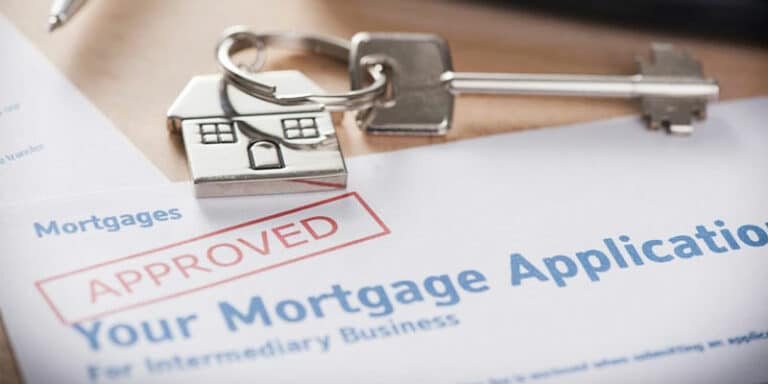Buying your first home can be both an incredibly exciting and challenging time in your life. There is a lot to wrap your head around, new language and terminology to learn and new processes to understand. It can be emotional, stressful, exciting and nerve-wracking all at the same time.
We have created this ultimate first home buyer guide to help you navigate the process from start to finish – getting you into your first home fast.
It is important to note that this is general advice designed to help you make informed decisions. Not everything may apply to your specific situation. If you are uncertain about a topic or have questions about anything, contact us so we can give you advice customised to your specific personal circumstances.
- Budgeting for your first home
- Types of home loans and repayment options
- How to apply for a home loan
- First homeowners grants & incentives in QLD
- Finding your home
- Buying your home
Budgeting for your first home
Budgets are the starting place of any new property purchase. Your budget and financial situation will dictate much of the home buying process, such as which lenders will lend to you and which houses you can afford. This is why making a budget and working out what your financial situation is should be done as early as possible.
Even if you think you are a few years away from being ready to buy your first house, talking to a broker to discuss what you actually need to do and the steps you should be taking will help set yourself up for when the time comes. They will be able to help guide you and give you goals to aim for along the way.

When setting your budget, there are a number of things to consider. The budget should be based on how much you can borrow and your financial situation, not on the type of house you want to buy or the properties available in your favourite suburb. Lenders will give you an indication of the maximum amount you can borrow, but this does not mean you should be borrowing that much. You need to consider costs like ongoing mortgage repayments, council rates, strata fees and insurance, as well as other hidden purchase costs such as pre-purchase inspections, legal fees and stamp duty (though first home buyers are often exempt from stamp duty).
The deposit is the main thing you will be saving towards leading up to your home purchase. It is the amount of money you contribute towards the purchase initially, and then a lender will make up the rest with a home loan. Deposits are typically 20 per cent of the purchase price, however, sometimes it can be as low as 5 per cent. As a general rule, the bigger the deposit, the smaller the loan. The smaller the loan, the smaller the repayments, and often the better the interest rate you can get.
Lender’s mortgage insurance (LMI) will most likely apply to you if your deposit is less than 20 per cent. LMI is designed to protect the lender in the instance that you default on your loan and the sale of the property does not equal the total amount owing. It is not to be confused with mortgage protection insurance that covers you in situations like sickness or job loss. The cost of LMI will vary depending on the size of your deposit and the value of the home. Depending on the lender, LMI can either be paid upfront or added to your home loan. There are also a few ways to avoid paying LMI that a broker can help you with, such as family guarantees and shared equity agreements. If you are unsure about LMI and how it will affect you and your budget, your broker will be able to guide you in the right direction. Sometimes it is worth waiting to save the full 20 per cent deposit to avoid it, and other times it may be more economical to pay LMI instead of waiting to get into the housing market.
When determining your budget, one of the best things to do is to conduct a hypothetical pressure test to assess your financial limits. Look at the budget you’ve designed and ask yourself if you could handle a 2 per cent interest rate rise. Would you be okay if you lost your job for a few months? This is something that lenders will also take into account when considering a loan application and will be an important part of ensuring you set yourself up for success.

Types of home loans and repayment options
There are a lot of questions that come from first home buyers about home loan terminology such as the difference between interest only versus principle and interest payments, variable versus fixed versus split rate loans. Here is an overview of what they are:
- Interest only versus principle and interest repayments
Interest only repayments are when your payments cover the interest and not the cost of the house or loan itself (the principle). Principle and interest repayments are where you pay both the interest charges and the loan amount at the same time. There are limits on how long you can do interest only repayments with usually a maximum of five years. In the right circumstances, short term interest only payments can be beneficial for first homeowners to help with cashflow through the initial costs like building inspections, legal fees and furniture purchases. - Variable, fixed rate and split loans
Variable home loans means that the interest rate on your loan will go up and down, depending mostly on factors like the Reserve Bank of Australia’s official interest rate. This means that your repayment costs can also go up and down. A fixed rate loan is exactly that, the interest rate is set for a period of time, usually one to five years, allowing you the stability of knowing what future payments are. The downside to this is that you will not be able to take advantage of falling interest rates if they happen and there is often a cap on how many extra repayments you can make if you want to pay off your loan quicker (which are often not limited under a variable home loan). A split loan is a mix of the variable and fixed interest options where you can fix the interest on part of your loan and leave the other part variable. For example, if your loan is $500,000 you can fix $200,000 and leave $300,000 variable.
Applying for a home loan
The majority of first home buyers need home loans to finance their purchase. Unless you have hundreds of thousands of dollars sitting in your bank account to buy your first home, you will need a bank or lender to loan you the difference between the property price and your deposit.
How to find the right loan
You can get a home loan either directly from a bank or through the help of a mortgage broker. Mortgage brokers are the ideal option for first home buyers as they can help guide and navigate you through the process from start to finish. If you approach a bank directly, they will have their small range of products and loan options to offer you, whereas a broker has access to every bank and lenders products. Brokers will go through your personal and financial situation and give you a shortlist of recommended lenders and products to choose from based on your unique needs and circumstances. Brokers will know which banks and lenders you are most likely to get the best deal from and where you are likely to be approved. They can help with the pre-approval and approval processes and guide you on everything from saving on a deposit, explaining the fine print and the steps you need to take.
The home loan process
There are two types of approval when getting a home loan – the preapproval and unconditional approval.

Preapproval (also known as conditional approval) is an indication from the lender of how much you can borrow. It is based on your personal and financial information such as your income and debts. The pre-approval is the first step that lets you know how much you are likely to get approved for and means you can begin searching for houses in your budget and price range. You can get pre-approval directly from a banking branch, over the phone or on the internet, however, a broker is the best way to get pre-approval options from multiple lenders without affecting your credit score with multiple applications to different banks. At the pre-approval stage, the lender is not obliged to give you the loan and can revoke the approval if your circumstances change or they do not accept the property you choose to buy.
Unconditional approval is what happens once you find the home you’d like to buy and fill out the application for the home loan. Unconditional approval indicates that the bank has accepted the property and is happy with your financial situation.
What banks look for in home loan applications
When you apply for a home loan, banks and lenders look at two things – you and the property you wish to purchase.
They will put you under a microscope, analysing your personal and financial situation. They look over your savings, income, expenses, debt and financial history to make sure you can afford the ongoing repayments of owning a home. What they are looking at specifically is your:
- Income – this includes your wages and any income from investments or businesses.
- Expenses – this is your living costs with things such as bills, groceries, transport and leisure considered.
- Debts – this is everything from credit cards, personal loans, car loans and student HECS-HELP loans.
- Financial history – they look at both your savings history and your credit history. For savings, they want to see that you have accumulated and held onto savings for at least three to six months. They consider whether you have enough surplus savings to continue meeting repayments if your family situation or job changes. Credit history checks look to see if you have defaulted on loans or credit cards in the past to assess the risk of future loans. If you have had defaults in the past, this may make the process more difficult, but not necessarily impossible. If you are concerned, a broker will be able to help you as they know which lenders are likely to work with you and how to present your history to explain your past circumstances and how they have changed.
If you are self-employed the process can sometimes be even harder as you don’t have the security that comes from an employer with a set income. It is not enough to say how much you earn, you have to prove it through your financial history and rigorous documentation. A broker will be able to guide you on the records and documentation you will need to pull together, how best to present it and which lenders you are most likely to get approval through.
Banks and lenders also consider the property that you are applying to buy before approving your home loan. They look at the loan to value ratio to make sure it is within a safe range and that the property is not a risky investment. They want to know that if you have to default on your loan that the house will still be able to be sold at a price that will cover the cost of the loan. For your first property, we suggest being wary of unusual or non-standard properties such as inner-city apartments, heritage listed real estate or bushfire prone and flood zoned properties. Most lenders see these as high-risk and you may have difficulty getting approved. You will have a much better chance of approval buying a standard residential home. If you are unsure if the bank will approve your property – contact us. We are the experts on home loans like these and can help you get approval for unique properties.

Additional tips for getting your loan approved fast
- Avoid changing your circumstances during the application time. If you are serious about buying your first house, this is not the time to make any major changes to your financial situation or job. If you do, you may find your application will get rejected or you will have to start the application process from the start again.
- Take your time, but not too much time. There is a 3-month time limit on your pre-approval amount. Buying your first property should not be rushed, but there is also an expiry date on pre-approvals which is usually 90 days.
- Don’t buy to your borrowing limit. Your pre-approved borrowing limit is only an indication of what you will be approved for. There are also a lot of other costs to consider such as stamp duty, conveyancing, legal fees and Lenders Mortgage Insurance (LMI)
Grants & Incentives in Qld
As a first home buyer, you will likely qualify for first homeowner grants and incentives to help you with the big financial step into the property market. These can vary from state to state.
In Queensland these grants and incentives include:
- You do not have to pay stamp duty on your first property if it is under $500k or vacant land under $250k. The stamp duty will be discounted on first home buyer properties under $549,999 or vacant land under $399,999.
- There is a $15k grant for new homeowners of new properties under $750k. To check your eligibility and find more see the QLD Government housing website: https://www.qld.gov.au/housing/buying-owning-home/financial-help-concessions/qld-first-home-grant
- There is a first home super saver scheme to help you with saving your first deposit. This involves using your super account to save your deposit somewhere you can’t easily access it. For more information head to the ATO’s website: https://www.ato.gov.au/Individuals/Super/Withdrawing-and-using-your-super/First-Home-Super-Saver-Scheme/
Finding Your Home
Finding your first home is usually the most exciting part of the process. It is a life changing decision and should be done with extensive thought and research.
Make a checklist.
Put together a checklist of what it is you are looking for in a property. Your list should include your non-negotiables and features you’d like to have. Depending on your budget, you may have to have two lists of ‘must haves’ and ‘would like to haves’ to find something that will meet both your desires and your budget.
Decide which suburbs and property types you want to look at.
Things to consider include
- Property values
- Employment options
- Public transport
- Schools
- Amenities like parks, cafes, and shopping centres
- Personal enjoyment – there is value in choosing something that fits your lifestyle. Where you live can have a big impact on your personal wellbeing, so if things like being close to friends, family and/or work are important to you, this is an important factor to weigh up in deciding on which suburbs to look and eventually buy in.
Inspect properties that you like and appear to fit your criteria.
- This is done either by appointment or open homes. When you attend either you should:
- Take your checklist
- Take pictures and notes while you are there to look back on later. You will not remember everything, especially if you are looking at multiple properties.
- Focus on the fundamentals of the house – look out for things like natural light, street noise, the direction of the sun, neighbouring properties.
- Ask the agent questions if you have them. Question when it was last renovated, why the property is selling, how long the vendor has had the property, whether any offers have already been placed and whether there are any known issues with the property.
- Professional inspections should also be conducted before purchasing the property.
- These are not just to uncover hidden issues but can be used as a bargaining tool for negotiation of price. Vendors are required by law to tell you any structural and underlying issues with the property, but they are limited to what they know. Professional inspections may uncover hidden issues that will protect you from a bad purchase and potentially affect the value of the house.
- Inspections to carry out include:
- Independent building inspection – they will carry out and put together an inspection report of the house structure, looking for any defects.
- Pest inspection – this can often be done with the building inspection. They also check for defects and pests including termites and borers.
- Strata inspection report – this is done when purchasing an apartment to show any problems or issues with the apartment building itself. It will provide information on the financial health of the building, showing any regular levies, income and expenditure, defects and insurance, as well as compliance with laws and any current disputes.
- NOTE: If you are looking at a property that is going to auction, you will need to get these checks done before the auction as once the hammer goes down you have technically purchased the property. You should not bid on a property unless you are 100 percent certain it is the one for you.

Buying Your Home
When you have found the house you want to purchase, you come to the processes of making an offer, negotiating, the exchange of contracts and settlement.
Making an offer
Deciding on what to offer the vendor will depend on things like market conditions, how much outside interest is on the property and your own personal circumstances. There is a balance between offering too low and insulting the vender and offering too close to the asking price and paying more than you should. Property brokers and valuers can help with this and give you advice on how much the house is worth.
Offers should be submitted in writing to the agent. Agents are legally bound to pass the offer on to the vendor for consideration. Your offer should outline how much you are willing to pay and any conditions you want to add to the contract such as repairs, and often a timeframe for sale and moving in will assist.
Negotiating
After you make an offer, there will often be negotiation between you and the vendor’s agent. This is where engaging a trained professional like a property broker is useful as they have extensive real-estate knowledge and negotiation skills.
- Exchanging contracts. When negotiations are finished and there is an offer both you and the vendor have agreed on, contracts are drawn up, signed and exchanged. The seller’s agent will usually be the one to draw up the contract.
This time is also when you will usually present your property to the bank to get your home loan unconditionally approved. To make sure you are not locked into a contract without finance, there is a financing contingency clause that can be added to the contract that expresses your offer is contingent on being able to secure the financing for the house. - Cooling off period. This is the time after the contracts have been exchanged where you as the buyer can still back out of the purchase. This gives you more time to undertake further investigations and inspections. The standard period for cooling off is between two and five business days. There is often a termination fee if you decide to back out in this time which is normally a small percentage of the sale price. It is important to note that properties sold at auction do not usually have a cooling off period.
- Auctions. Purchasing a property at auction is a very different process. Once the hammer goes down on an auction, if you are the highest bidder you have technically purchased the property unconditionally. This is how auctions work:
- Auctions are usually held at the property itself and the auctioneer’s role is to encourage bidding and get the best result for the vendor.
- Bidders register for the auction either in advance or on the day.
- During bidding, there is a phrase used by auctioneers of ‘on the market’ when the bidding hits the reserve price, the minimum price the vendor will accept. If it goes ‘on the market’ the property will be sold. If bidding does not reach reserve and the auctioneer does not state the property is ‘on the market’, the property can pass in, meaning it is not sold. At this time, however, the highest bidder will normally have the first chance to negotiate a price with the vendor. There is no obligation on the vendor to sell at any point if the property does not go ‘on the market’.
- If you win the bidding at an auction, you will be required to pay a 10 percent deposit on the day. There are penalties for pulling out of an auction sale and you risk forfeiting your deposit.
If you are planning on buying your first home through an auction, it is highly recommended to have a property broker go with you or on your behalf. They are experienced professionals that can help you know how to approach the bidding process and how to strategically navigate the auction process.
Settlement
This is when the ownership of the house or property is transferred from the vendor to the buyer. It usually takes place six weeks after the exchange date and is listed on the contract. There is nothing for you to attend on settlement day and it is usually managed by the solicitors and conveyancers.
On settlement day, the purchase price is transferred from the lender to the buyer’s bank account. Once payment is confirmed the buyer can pick up the keys to their new home.


Contact BrokerCo for help
There is clearly a lot to learn and do when it comes to purchasing your first home. It can often be overwhelming and difficult to navigate. As your mortgage broker, it is our aim to help you through the process quickly and easily, taking out the stress surrounding getting a home loan and helping you enjoy the excitement of finding and buying your first home. We are here to help guide you and give you advice to make it simple.
Contact us today to speak to one of our friendly, experienced professionals!
Recent Articles



